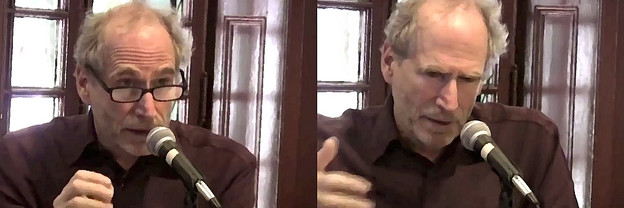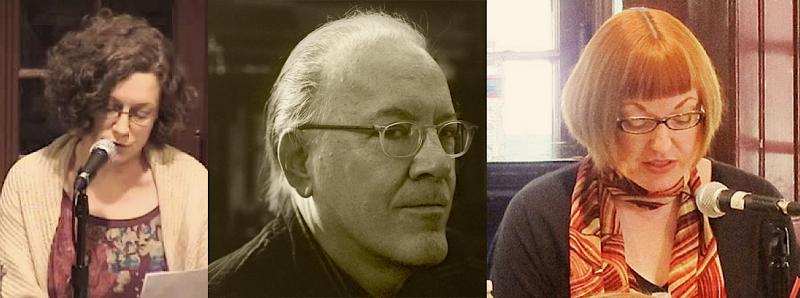
An abductee, in theory (PoemTalk #92)
Bob Perelman, 'Confession'

Al Filreis convened Kristen Gallagher, Kathy Lou Schultz, and Bruce Andrews for a conversation about a poem by Bob Perelman, “Confession,” which the poet once introduced (jokingly, yes?) as “the inside story of Language writing.” “Confession” was published as the first poem in — indeed, arguably it serves as a proem to — Perelman’s book The Future of Memory. Its speaker satirically imagines that avant-garde poets had been abducted by aliens, in the manner of 1950s science fiction. As abductees (the speaker concedes he is one) they have been ... well ... transformed into the poets they are. At several points in his confession, the speaker wonders whether his and others’ modes haven’t indeed been programmed — haven’t resulted from an alien intervention, been “inculcate[d] … with otherworldly forms.” Perhaps the “variety” of poetic styles and forms is actually, when read through the sci-fi conspiracy theory, a totalized monoculture hatched by coup-minded Body Snatchers. In the course of this poem our poet-speaker begins to snap out of it, perceiving the putsch and feeling new self-doubt. And: “Why don’t [the abductors] ever / reveal themselves hovering over some New / York publishing venue?”
 Beyond the comic, clever skein of Manchurian Candidate-ism in this poem, our panel reads the poem’s expression of anxiety over whether its speaker truly is a card-carrying member of the avant-garde, devoted to breaking completely free from what such poetry’s detractors deem inhuman and automatic, the result of brainwashing. How much does the poet by this point lament the absence, in his poems, of “That old stuff, the fork / in my head, first home run, / Dad falling out of the car — / I remember the words, but I / can’t get back there anymore.” As thus a meta-poem, the poem does indeed “get back there,” but only to wonder whether such formative personal scenes, the poetic stuff of the lyricized self, belong sincerely to the work of the poet whose exclusions are the result of the lamented inculcations. Kristen, Kathy Lou, and Bruce have a good deal to say on this point, and come to various conclusions about the extent of Perelman’s poetic nostalgia. Is this poem a confession of its longing for pre-ideological origins? The future of memory for an aging poet might be the present, as memory fades, as the stretch of the poetic drift runs long. But here the future of memory is indeed memory, and seems to require this difficult, though hilarious, rethinking of poetic identity. (Above at right, from right to left: Kristen Gallagher, Bruce Andrews, Kathy Lou Schultz.)
Beyond the comic, clever skein of Manchurian Candidate-ism in this poem, our panel reads the poem’s expression of anxiety over whether its speaker truly is a card-carrying member of the avant-garde, devoted to breaking completely free from what such poetry’s detractors deem inhuman and automatic, the result of brainwashing. How much does the poet by this point lament the absence, in his poems, of “That old stuff, the fork / in my head, first home run, / Dad falling out of the car — / I remember the words, but I / can’t get back there anymore.” As thus a meta-poem, the poem does indeed “get back there,” but only to wonder whether such formative personal scenes, the poetic stuff of the lyricized self, belong sincerely to the work of the poet whose exclusions are the result of the lamented inculcations. Kristen, Kathy Lou, and Bruce have a good deal to say on this point, and come to various conclusions about the extent of Perelman’s poetic nostalgia. Is this poem a confession of its longing for pre-ideological origins? The future of memory for an aging poet might be the present, as memory fades, as the stretch of the poetic drift runs long. But here the future of memory is indeed memory, and seems to require this difficult, though hilarious, rethinking of poetic identity. (Above at right, from right to left: Kristen Gallagher, Bruce Andrews, Kathy Lou Schultz.)
This 92nd episode of PoemTalk was produced by Al Filreis, engineered and edited by Zach Carduner. It happened to have been recorded on the day Bob Perelman was celebrated at the Kelly Writers House on the occasion of his retirement from teaching.
* * *
CONFESSION
Aliens have inhabited my aesthetics for
decades. Really since the early 70s.
Before that I pretty much wrote
as myself, though young. But something
has happened to my memory, my
judgment: apparently, my will has been
affected. That old stuff, the fork
in my head, first home run,
Dad falling out of the car —
I remember the words, but I
can’t get back there anymore. I
think they must be screening my
sensations. I’m sure my categories have
been messed with. I look at
the anthologies in the big chains
and campus bookstores, even the small
press opium dens, all those stanzas
against that white space — they just
look like the models in the
catalogs. The models have arms and
legs and a head, the poems
mostly don’t, but other than that
it’s hard — for me anyway — to
tell them apart. There’s the sexy
underwear poem, the sturdy workboot poem
you could wear to a party
in a pinch, the little blaspheming
dress poem. There’s variety, you say:
the button-down oxford with offrhymed cuffs;
the epic toga, showing some ancient
ankle; the behold! the world is
changed and finally I’m normal flowing
robe and shorts; the full nude;
the scatter — Yes, I suppose there’s
variety, but the looks, those come
on and read me for the
inner you I’ve locked onto with
my cultural capital sensing device looks!
No thanks, Jay Peterman! No thanks,
“Ordinary Evening in New Haven”! I’m
just waiting for my return ticket
to have any meaning, for those
saucer-shaped clouds to lower! The authorities
deny any visitations — hardly a surprise.
And I myself deny them — think
about it. What could motivate a
group of egg-headed, tentacled, slimier-than-thou aestheticians
with techniques far beyond ours to
visit earth, abduct naive poets, and
inculcate them with otherworldly forms that
are also, if you believe the
tabloids, salacious? And these abductions always
seem to take place in some
provincial setting: isn’t that more than
slightly suspicious? Why don’t they ever
reveal themselves hovering over some New
York publishing venue? It would be
nice to get some answers here —
we might learn something, about poetry
if nothing else, but I’m not
much help, since I’m an abductee,
at least in theory, though, like
I say, I don’t remember much.
But this writing seems pretty normal:
complete sentences; semicolons; yada yada. I
seem to have lost my avant-garde
card in the laundry. They say
that’s typical. Well, you’ll just have
to use your judgment, earthlings! Judgment,
that’s your job! Back to work!
As if you could leave! And
you thought gravity was a problem!